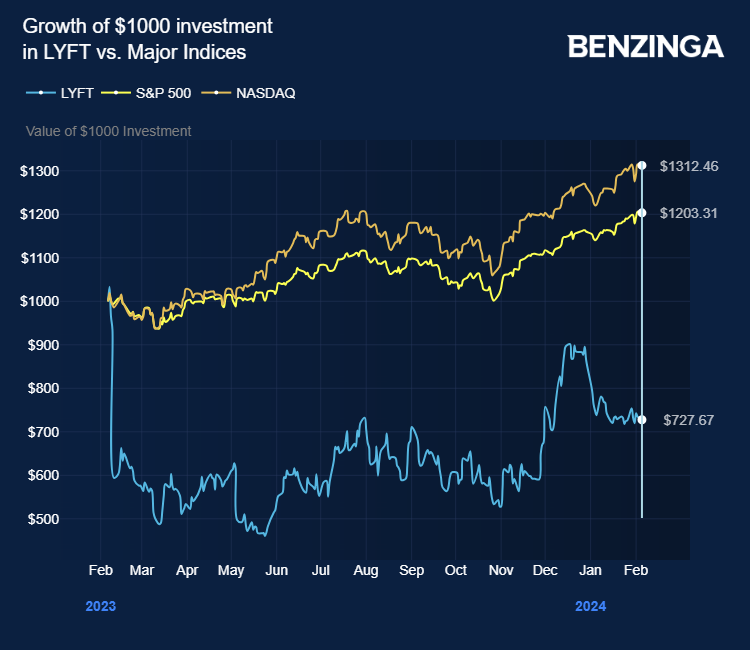Zinger Key Points
- Uber reports its Q4 earnings on Wednesday, while Lyft is Feb. 13.
- RBC Captial Markets has a Sector Perform rating on Lyft and an Outperform rating on Uber.
- Feel unsure about the market’s next move? Copy trade alerts from Matt Maley—a Wall Street veteran who consistently finds profits in volatile markets. Claim your 7-day free trial now.
Ride-hailing competitors Uber Technologies Inc UBER and Lyft Inc LYFT both report fourth-quarter earnings in the coming days and analysts at RBC Capital Markets believe both can beat market estimates.
Uber reports on Wednesday, Feb. 7, and is expected to post fourth-quarter earnings of $0.15 a share, down around 48% from last year.
Although this seems like a dramatic drop, the company flagged up at the end of 2023 high sales and marketing expenses, and costs associated with driving incentives following changes in the company’s business model.
Revenues are expected to increase 13.2% from the year-ago period to $9.75 billion, with the top line benefiting from strength in its food delivery service and mobility business.
Consensus estimates on Lyft, which reports on Tuesday, Feb. 13, expect fourth-quarter earnings of $0.08 a share — which would represent growth of 111% over the same quarter a year ago. Revenues are expected at $1.22 billion, up 3.6% over the same quarter in 2023.

Also Read: Alibaba Earnings: Can Q4 Earnings Provide Pivot Point For Beleaguered Investors?
A Picture Of Health
RBC Capital Markets was positive on the sector, saying the key industry takeaway should be that the sector is “a picture of health.”
Analyst Brad Erickson said: “The combination of Uber and Lyft’s pricing continuing to move in lock-step higher, and meaningfully lower wait times indicates lower driver incentive intensity, suggesting demand is healthy and rationally competitive.”
RBC Capital Markets maintained a Sector Perform rating on Lyft stock and a $15 price target. The shares were trading at $12.74 on Monday afternoon.
RBC Capital Markets held its Outperform rating and $65 price target on Uber, but its shares have already surpassed this at $69.69, indicating the broker believes the stock may be getting a little overpriced.
Uber Has Outperformed Lyft Since Debuts
Shares in Uber have enjoyed some long-term gains as the business has grown since its market debut in May 2020. After a downturn in 2021, the stock gained 227% since July 2022.
Lyft’s share price history has been rather checkered. Since its debut, 14 months before Uber, the shares, which started at $87, have been on a long-term decline.
Erickson at RBC Capital Markets said: “Since the Covid thaw, Lyft has generally been at a noticeable disadvantage due to Uber having made more proactive investments in driver supply and Lyft’s heavier West Coast exposure weighed on its overall market share position which then led to persistent bottom-line underperformance given its lower scale.”
He added that the company was getting to a place where it could now compete on a more level footing for rides — particularly on the West Coast where it punches above its weight.
For Lyft, he concluded: “Investors will be looking for clear signs that the company can maintain share
on a rides and bookings basis.”
And on Uber, he concluded: “With the profitability having proven itself so well over the past few years, better belief in bookings growth is the next hurdle for further stock appreciation, in our view.”
Now Read: China Market Rout Continues, With Small Caps Feeling The Pain Despite Beijing’s Intervention
Edge Rankings
Price Trend
© 2025 Benzinga.com. Benzinga does not provide investment advice. All rights reserved.
Trade confidently with insights and alerts from analyst ratings, free reports and breaking news that affects the stocks you care about.